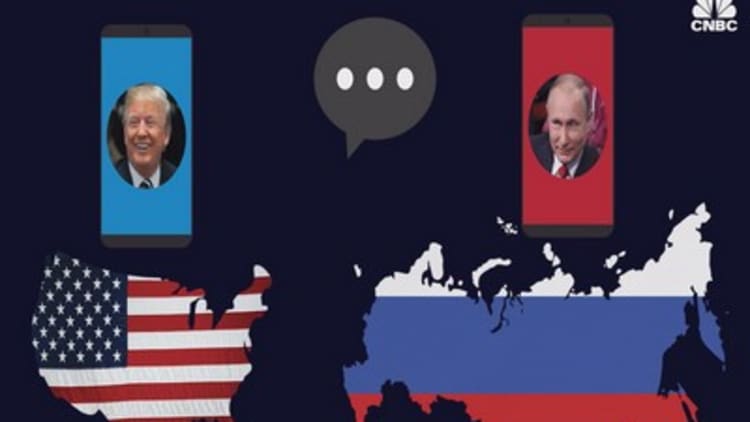President Donald Trump said Tuesday that he was "very concerned that Russia will be fighting very hard to have an impact on the upcoming Election."
But rather than benefit his own party, as Russia sought to do in 2016, Trump claimed without offering any evidence that Russia "will be pushing very hard for the Democrats" because, Trump said, "no President has been tougher on Russia than me."
The tweet represented a new type of rhetorical gymnastics for the president, one where America's greatest geopolitical adversary is not, in fact, interfering in the election to help Trump, as it did in 2016, but is instead launching attacks aimed at helping Trump's opponents.
The president's tweet followed a two-week period marked by intense scrutiny of Trump's relationship with the Kremlin and with Russian President Vladimir Putin. Trump has long insisted that the United States would benefit from a closer relationship with Russia, an opinion which is not universally shared by U.S. diplomats, intelligence officials or congressional leaders.
A summit between the two leaders in Helsinki this month backfired on Trump, however, after the president refused to hold Putin accountable for Russia's 2016 election attacks, its annexation of Crimea or its backing of the Assad regime in Syria.
During a joint news conference with Putin after the summit, Trump also appeared to put more faith in the Kremlin's denial that Russia had engaged in widespread election interference, than he did in the findings of his own intelligence services, who concluded that Russia did, in fact, attack the 2016 presidential election.
At the same news conference, when Putin was asked whether he had wanted Trump to win the 2016 election, he said, "Yes, I did. Because [Trump] talked about bringing the U.S.-Russia relationship back to normal."
After Trump's victory, the newly minted then-president elect tweeted out Putin's criticism of his opponent, Hillary Clinton.
Trump's claim that "no president has been tougher on Russia" is a phrase that's become his standard response to critics who question why the president is so reluctant to publicly denounce Kremlin attacks on U.S. infrastructure, U.S. elections and U.S. allies.
As evidence of this toughness, the president often points to sanctions on Russian oligarchs that he signed into law in August 2017, and to the expulsion of 60 Russian diplomats from the United States in March 2018, in response to the nearly fatal nerve agent attack on a Russian former double agent in Britain.
What Trump does not say, however, is that he has personally opposed nearly all of these measures. He only agreed to sign new sanctions into law in 2017 when it was clear that Congress had a veto-proof majority. And he was reportedly furious in March when he realized the full scope of his administration's expulsion of Russian diplomats in response to the U.K. nerve agent attack.
Meanwhile, Trump has lavished praise on Putin for years, calling him "a strong leader" and predicting the two men would have a great relationship. In a memorable exchange with reporters in August 2017, Trump actually thanked Putin for expelling U.S. diplomats from Russia, a move seen by experts as an affront to the United States. But not to Trump, who argued that the Russian leader had actually helped the U.S. government to "cut our payroll" costs.
Even as Trump boarded his plane bound for NATO meetings and then the Helsinki summit, the president said he would likely have an easier time talking to Russia, which NATO considers its greatest threat --- than he would talking to leaders of America's NATO allies.
Trump's warm embrace of Putin and Russia is all the more baffling given the dark cloud that has hung over Trump's entire presidency: Special counsel Robert Mueller's investigation into whether Trump's presidential campaign colluded with Russia to subvert the 2016 presidential election. In a little over a year, the investigation has uncovered scores of previously unknown contacts between Russian agents and many of Trump's closest advisors, aides and business partners. As of Tuesday, the special counsel had issued indictments against 32 individuals and three Russian companies.
But while Trump's affinity for Russia has fostered divisions within the GOP, Democrats have set aside deep divisions caused by the 2016 primary contest between Hillary Clinton and Bernie Sanders. Now, the Democrats are unified behind a view that Russia is a mortal foe of the United States, and that Putin represents the greatest living obstacle to the spread of democracy in Europe, rule of law and respect for human rights.
Practically from the moment Trump took office, Democrats have called on the Trump administration and Republican leaders in Congress to impose tougher measures against Russia. The most recent call came last week, when Senate Minority Leader Chuck Schumer demanded that Republicans in Congress increase sanctions against Russia and pressure the president to request that the Kremlin extradite 12 Russian spies who were recently charged with hacking American targets during the 2016 election.
Correction: A former Russian double agent was nearly killed by a nerve agent attack in Britain. An earlier version misstated his condition.
WATCH: The Trump-Russia ties hiding in plain sight



